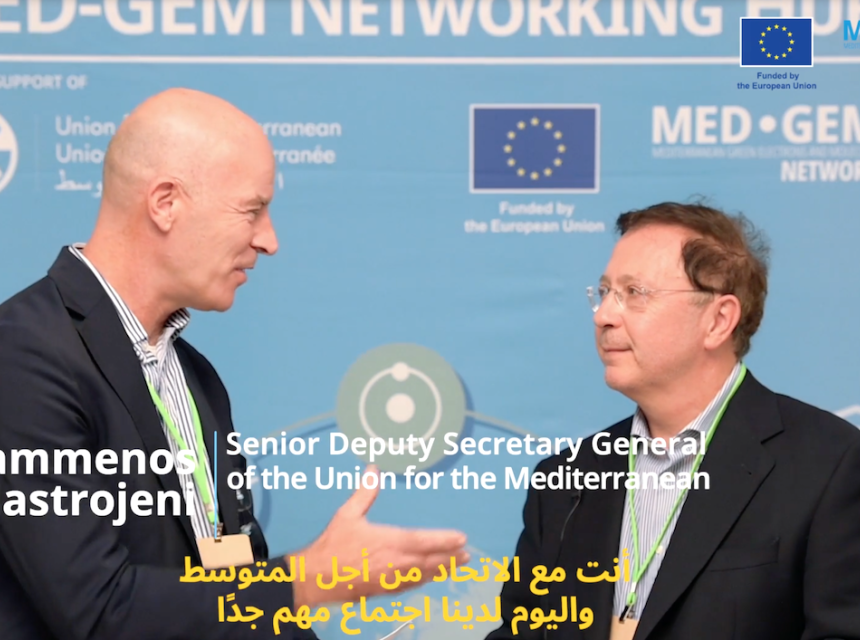The day Green Hydrogen Joined the UfM Energy Platforms
The inaugural Mediterranean Green Week, organized by the Union for the Mediterranean (UfM) and OECD in Istanbul last May 14-15-16th 2024, provided a vibrant platform for key players in the renewable energy and gas sectors to converge and discuss transformative green energy initiatives. With « Green Spark Studio », Frank Wouters, the director of MED-GEM, hosted a series of insightful interviews, bringing together inspiring personalities from both shores of the Mediterranean.
📺 Watch in English with Arabic Subtitles
During the annual activities of the three UfM Energy Platforms (dealing with electricity markets, renewable energy, energy efficiency and natural gas in the Mediterranean region), Frank Wouters sat down with Pr. Grammenos Mastrojeni, Senior Deputy Secretary General of the UfM. Their conversation delved into the intricacies and future prospects of green hydrogen, its financing, and the broader landscape of renewable energy in the region.
A Mediterranean Renewable Energy Community
Frank Wouters began the interview by highlighting the significance of the ongoing meetings. Pr. Grammenos Mastrojeni shared that the current phase marks a transition from establishing the science behind renewable energy to taking concrete steps towards building what he termed the "Mediterranean Renewable Energy Community".
"The European Union aims to decarbonize by 2050, but it is quantitatively impossible without relying on wind power from the Balkans or solar power from the southern shore," Pr. Mastrojeni explained. He emphasized the necessity of external markets and adequate financing to develop these renewable energy sources.
Tackling Bottlenecks and Setting Standards
Pr. Mastrojeni revealed that the morning Annual Meeting of the UfM Energy Platforms session mandated them to address hydrogen, green hydrogen, emissions abatement, and clean technologies. However, a critical focus is on solving bottlenecks that hinder effective interconnection, particularly the establishment of uniform legal and technical standards across the region.
"We are engaged in solving the bottlenecks that make this interconnection more viable," Mastrojeni stated. Despite the presence of finance, political will, and industry readiness, he acknowledged the challenges in creating a standardized system.
Overcoming Obstacles in Renewable Power Deployment
Upon picking a random question, Pr. Mastrojeni was asked about the primary obstacles hindering renewable power generation in the target countries, with a focus on the southern Mediterranean. He identified the lack of standardized systems and the fragmented traditional grids in the South as significant barriers. These fragmented grids fail to provide a reliable backup, necessitating South-to-South energy integration.
"We need, during a certain period, to rely also on traditional grid systems, but traditional grids in the South are fragmented," Pr. Mastrojeni pointed out. He also mentioned that overcoming these obstacles involves both market and political challenges.
The North Africa Grid: A Feasible Vision?
Discussing the vision of a North Africa Grid extending from the Maghreb to the Middle East, Pr. Mastrojeni acknowledged the complexity of achieving this in the short term. "Even if there were no particular difficulties in terms of other aspects, it requires investment planning and so on," he said. Nevertheless, he expressed optimism, noting the shared interest and rapid progress in discussions.
As the Mediterranean Green Week has ended, these discussions are paving the way for a more sustainable, cooperative, and green future for the Mediterranean nations.
Stay tuned for more insights and revelations from MED-GEM Networking Hub.

